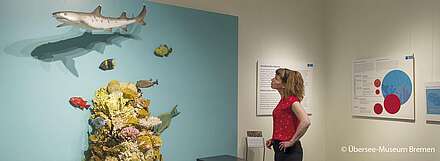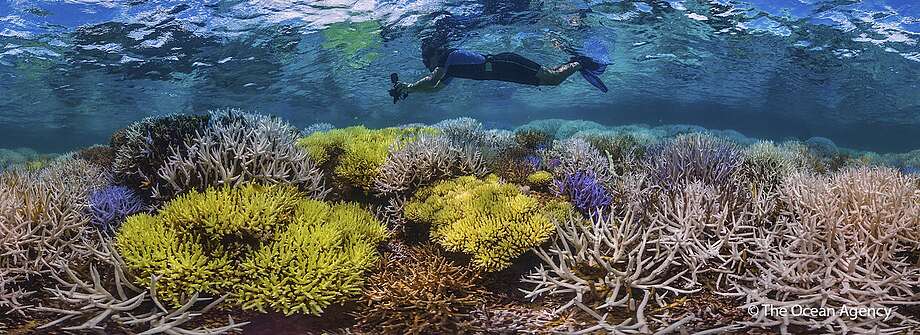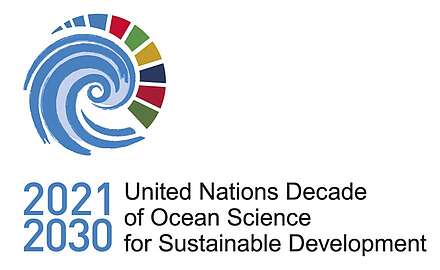Outreach Events
Here you can find additional program like exhibitions, a filmfestival and lecture series. Please scroll through and join us. The past events are listed below.

Here you can find additional program like exhibitions, a filmfestival and lecture series. Please scroll through and join us. The past events are listed below.


July 4, 2022 - September 15, 2022
Coral reefs are by far the most species-rich ecosystems in the oceans and one of the few ecosystems where you can experience biodiversity in a very special way. Nowhere is the variety of colors and shapes greater and more visible. In bleached and dead reefs, however, only three colors dominate: white, gray and green. The photo exhibition impressively shows the incredible visual contrast between healthy and damaged reefs.
Adress: Haus der Wissenschaften, Sandstraße 4/5, 28195 Bremen
The exhibition was created in cooperation with the Naturwissenschaftlicher Verein Bremen and was funded by the Senator for Climate Protection, Environment, Mobility, Urban Development and Housing.
The ICRS 2022 with all its events is now part of the UN OCEAN DECADE ACTIVITIES. More infos about the United Nations Decade of Ocean Science for Sustainable Development? Click here

With financial support from the Senator for Climate Protection, Environment, Mobility, Urban Development and Housing and the Naturwissenschaftlicher Verein Bremen (NVB).


Thursday, 04 November 2021, 8:15 p.m. Onlineveranstaltung
Dr. Yusuf C. El-Khaled, University of Bremen, Marine Ecology and Dr. Carin Janzen, SECORE INTERNATIONAL, Bremen.
The numbers are discouraging: Around 30% of all coral reefs worldwide no longer exist, 40% are currently threatened. The International Coral Reef Society therefore demands: Save the coral reefs! But how? Answers to this question are provided by Yusuf C. EL-Khaled, marine biologist at the University of Bremen in the Department of Marine Ecology, and coral reef ecologist Carin Jantzen have the answers. They explain how scientists can stop coral mortality - also in an unconventional way.
Saturday, 19 March 2022, 11:00 a.m. - 11:45 a.m.
Watch the recording of the talk here.
Already used in ancient times as a material for jewelry, corals were first considered as animals in 1723. Since then, the study of coral reefs has evolved from the first species descriptions, to observations of reef ecology, to investigations of corals by diverse scientific disciplines. The use of new methods and technologies to study the coral reef ecosystem continues to bring new aspects to light. In her lecture, the speaker will take the visitors on a short journey through the history of coral reef research: how it started, where it is today and what still needs to be explored in the future.
Adress: Haus der Wissenschaften, Sandstraße 4/5, 28195 Bremen (Admission free)
Tuesday, March 30, 2022, 7:00 p.m. - approx. 8:30 p.m.
Corals are changing the geology of our planet, protecting our coasts, feeding hundreds of millions of people, and providing medicinal ingredients. The economic value of reefs is gigantic. We also share many genes with corals. 500 million years ago plus x, we had a common ancestor. But humans have already destroyed about one-third of coral reefs through overfishing, sediment inputs, violence and pollution. Global warming could finish off the corals. With the corals, the basis of life for at least one third of all marine life would be lost. What does that mean for life on this planet? What does it mean for us? How can corals and their death change our perception of the world?
Adress: Museum Frieder Burda, Lichtentaler Allee 8b, 76530 Baden-Baden
Tuesday, April 19, 2022, 7:00 p.m. - approx. 8:30 p.m.
In the tropics, about one billion people depend directly and indirectly on coral reefs for their economic livelihood. Join us on a journey to the tropics and learn how people profit from coral reefs and what dangers this poses to the reefs.
Adress: Übersee-Museum Bremen, Bahnhofsplatz 13, 28195 Bremen (Admission: 5,00 Euros, reduced 4,00 Euros)
Saturday 23 April 2022, 11:00 a.m. - 11:45 a.m.
For a long time, marine biologists could not explain how it was possible for stony corals to build gigantic reef complexes in extremely nutrient-poor waters. These reef complexes captivate, among other things, by their unique biodiversity and extraordinarily high primary production. For some time, scientists puzzled over the question of how corals acquire the energy for this high primary production. This reef paradox or Darwin paradox, as it is also called, could only be explained step by step in recent years. One strategy to explain this paradox is provided by the discovery of how stony corals obtain the vital nitrogen. But no sooner has this question been resolved than marine biologists are confronted with the next question: How does climate change affect this vital process?
Adress: Haus der Wissenschaften, Sandstraße 4/5, 28195 Bremen (Admission free)
Saturday, 21 May, 2022, 11:00 a.m. - 11:45 a.m.
Carin Jantzen has worked in the coral reefs of the tropics and with cold-water corals in Chile. Today, she heads the public relations department of the non-profit organisation SECORE, an internationally operating organisation that develops methods and technologies for holistic and large-scale reforestation of corals. This is also the topic of her presentation: "A particular challenge in reforestation of coral reefs is to preserve genetic diversity. This can be achieved if corals are by means of sexual reproduction. But how does that work?
Adress: Haus der Wissenschaften, Sandstraße 4/5, 28195 Bremen (Admission free)
Saturday, 18 June, 2022, 11:00 a.m. - 11:45 a.m.
Adress: Haus der Wissenschaften, Sandstraße 4/5, 28195 Bremen (Admission free)
Friday May 20, 2022, 7:00 p.m.– 10:00 p.m.
The Emmy award-winning documentary "Chasing Coral" documents and visualizes the process of coral bleaching for the first time with impressive, moving images. Numerous prominent scientists have their say and talk about the effects of climate change on coral reefs.
Don't miss the opportunity to discuss with two of these scientists, James W. Porter and Zackery Rago as well as Andréa Grottoli (ICRS), Christian Wild (University of Bremen) and Simon Jungblut (NWV-Bremen) after the screening.
Adress: Haus der Wissenschaften, Sandstraße 4/5, 28195 Bremen
The exhibition was created in cooperation with the Naturwissenschaftlicher Verein Bremen and was funded by the Senator for Climate Protection, Environment, Mobility, Urban Development and Housing.
Thursday, June 30, 2022, 6:00 p.m. - 10:30 p.m.
For this film festival this year, the marine conservation organization DEEPWAVE e.V. has teamed up with the 15th International Coral Reef Symposium (ICRS), the largest conference for coral researchers, and the NWV. As the ecosystem most affected by human degradation, coral reefs are in deep crisis and will likely become extinct in our lifetime - unless we find solutions quickly. This makes the ICRS more important than ever.
You can expect an evening full of stimulating films and lively discussions with scientists and filmmakers at the Schauburg, Bremen's oldest sound cinema.
You can look forward to the following films, among others:
Adress: Schauburg, Vor dem Steintor 114, 28203 Bremen (Admission: free of charge, 0€ tickets must be picked up in advance at the Schauburg)
A cooperation with DEEPWAVE e.V., the University of Bremen, the 15th World Coral Reef Conference "ICRS 2022" (www.icrs2022.de) and ehe Naturwissenschaftlicher Verein Bremen (NWV) with financially supported by the Senator for Climate Protection, Environment, Mobility, Urban Development and Housing Weitere Informationen: www.deepwave.org/icrs
Budder bei die Fische - Der Ter Veen Talk
Das wertvollste Ökosystem der Welt - Korallenriffe.
30. September, 2022
In der besten Talkshow der Welt, Budder bei die Fische erzählt Prof. Dr. Christian Wild der Moderatorin mit Anneke ter Veen, warum Korallenriffe so wichtig für uns Menschen sind und was wir tun können, um sie zu retten. Gerade in unserer Zeit des Klimawandels ein sehr wichtiges Thema!
WOYTON Bremen
Langenstraße 31
28195 Bremen
Gleich nebenan ist das Parkhaus.
BREPARKhaus Pressehaus
Langenstraße 31
28195 Bremen
Beginn der Aufzeichnung ist um 20.00 Uhr und endet etwa um 21.30 Uhr.
Einlass der Zuschauer ist um 19.30 Uhr. Der Eintritt beträgt 10€ an der Abendkasse.
Facebook Veranstaltung:
https://www.facebook.com/events/5551709858181607
May 7, 2021 - July 10, 2022
The exhibition addresses the enormous importance of coral reefs to the oceans and humans, as well as the global and local threats that reefs face, and shows how these sensitive ecosystems can be protected.
Adress: Übersee-Museum Bremen, Bahnhofsplatz 13, 28195 Bremen
Sunday, July 3, 2022, 14:00 p.m.
☰